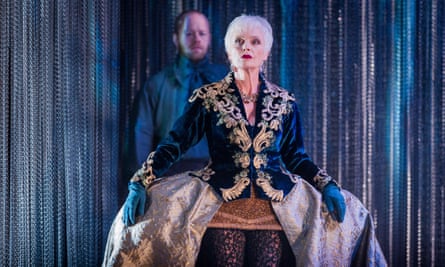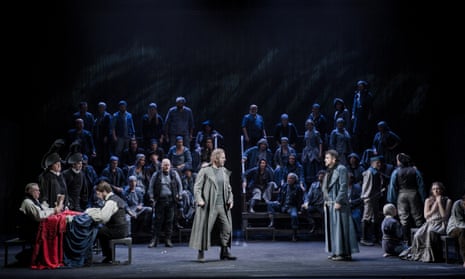It may not be altogether fair to describe Umberto Giordano as a poor man’s Puccini, but it is true to say that it is the lot of the poor man that comes rhetorically to the fore in this Italian opera verismo, set in revolutionary France. Andrea Chénier was a hit in 1896 when it opened, and continues to be – when intermittently revived – a dashing, pacily melodramatic crowd-pleaser, with enticing arias for the tenor in the title role and a showy assertion that love and death are the same thing. Giordano was feted at a moment when Italy was searching for Verdi’s successor – but it was Puccini who would eventually prevail.
Annabel Arden, co-founder of Complicite, is at the helm of this spirited Opera North production and particularly secure in her direction of a callous beau monde – a salon with a touch of the grotesque, compellingly led by Fiona Kimm’s Contessa de Coigny, whose eccentric dress has gold extensions at each hip that appear solid as sideboards (Complicite chic). She and her daughter, Maddalena, play while France burns, but they will not last long. Their aristocratic insouciance is contrasted by the tuneful integrity and cussedness of the poet Andrea Chénier himself. Tall, dark and handsome and in a fantastic, almost floor-length, tailored grey overcoat, Rafael Rojas sings with unruffled dignity. He is a beautifully seasoned tenor, and a man not about to lose his cool to any trundling tumbrel. He does a sublime line in reproaching the gilded household for their failure to understand what it means to be a poet. And, when he falls in love with Maddalena, his voice takes off – his gallantry transcendent.
The real André Chénier (1762-94), the French poet upon whom the opera is based, was guillotined at the end of the revolution without a lover to keep him company. Luigi Illica’s libretto is a loose reworking of his life, and involves poetic licence about his death (an excellent programme essay by the poet Stephen Romer puts us straight on what happened). Arden cannily salutes the original Chénier by having Rojas quote some of his poetry in Romer’s English translation: an affecting move.
No romance is complete without competition, and Carlo Gérard, servant of the house, is Chénier’s rival for Maddalena’s love. He is superbly sung by Robert Hayward, who combines iron will with vulnerability. This is a first-rate, complicated take on a servant who needs to master emotion. It is Gérard who later trumps up reasons to send Chénier to the guillotine. But when Maddalena (now in love with Chénier) shames Gérard by showing him that love is about sacrifice, he is belittled by her greatness and resolves to rescue his rival.

Annemarie Kremer brings supplicatory fervour to Maddalena (although the marvellous orchestra, under conductor Oliver von Dohnányi, threatens, early on, to overpower her). At other moments her voice is thrillingly cavernous, as if coming to us from a long way off, the perfect sound with which to express Maddalena’s displacement. One tiny cavil: when singing about exaltation to Chénier in jail and imagining herself transfigured, a smile is sadly wanting.
Joanna Parker’s set and costumes hint at endings: dusky pinks, blues and greys in a fast fade. The French flag, when it appears, is fittingly mangled (la patrie an embattled subject). The set is an intriguing jumble: walls of dangling chains, confiscated stone Madonnas, tiered seats from which a mob might watch an execution. The opera moves along at a tremendously enjoyable lick but seldom moves in the other sense. The finale must be fantastically difficult to perform: a scene in jail of enraptured overstatement in which kisses are requested but not always delivered, as full-on singing keeps getting in the way. But Arden keeps her cool and ends decisively, understanding the simple power of turned backs as the unlucky couple leave the audience and their lives and walk off stage.

Comments (…)
Sign in or create your Guardian account to join the discussion